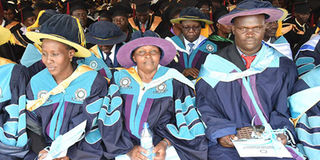Time we put the philosophy back into PhD

Masinde Muliro University of Science and Technology holds its graduation ceremony in Kakamega on December 14, 2018. PhD training is threatened by professors who quantify goals and rewards by emphasising publishing rather than scientific vigour. PHOTO | FILE | NATION MEDIA GROUP
What you need to know:
- The degree can open doors, especially in academia but also in business. Thus the output of the study, or thesis, can be globally damaging or outstandingly impactful.
- Researchers continue to call on Doctor of Philosophy students to be thinkers, not narrowly focused researchers.
Lack of progressive education policies and irresponsive educational curriculum were among the elements that silently crippled the global financial infrastructure in 2008.
Many experts now agree that the concept of education needs refining to ensure lives that are economically, politically and socially responsible rather than only serving industries.
Science education experts have boldly called for more “scientific literacy” to match the demands of today’s standard-based accountability.
In 2014, the Organisation for Economic Cooperation and Development (OECD) emphasised “an understanding of science and technology” for being “central to a young person’s preparedness for life in modern society”.
That may explain the intensification of global demand for science, technology, engineering and math (Stem) professionals.
But that has also put the spotlight on the advanced research degree. Researchers continue to call on Doctor of Philosophy students to be thinkers, not narrowly focused researchers.
PROBLEM-SOLVERS
In the more advanced doctorate schools, trainers stress the general “life scientific” and aspects such as serendipity of discoveries and scientific limitations.
Dr Gundula Bosch, a PhD trainer at Johns Hopkins University in Baltimore, USA, hopes to inculcate in her students the spirit of “applying rigour to their design and conduct of experiments; view their work through the lens of social responsibility; and think critically, communicate better and thus improve reproducibility”.
PhD researchers are the “nut and bolt” of the laboratory research. FindAPhD.com defines a PhD holder as “an authority in full command of the subject right up to the boundaries of current knowledge and able to extend them”.
The degree can open doors, especially in academia but also in business. Thus the output of the study, or thesis, can be globally damaging or outstandingly impactful.
Yet the world has lately been treated to negative results. In 2015, the University of Wollongong, one of the most revered, awarded a PhD for a thesis, “A critical analysis of the Australian government’s rationale for its vaccination policy”.
FAKE DEGREES
But in a review, different authors have castigated it as lacking evidence of systematic literature review and outrightly misrepresenting facts.
And Kenya has not been immune from the PhD conundrum pervading the “academic metabolism”.
That it respites on a “volatile” educational system that lurches from one impulsive policy to another is largely a “debt sentence”, forming a fertile ground for “falsified academic qualifications”.
The Commission for University Education recently established that JKUAT, which supposedly enjoys an unparalleled position in science and technology in Kenya, awarded “fake” PhD degrees.
Traditionally, a PhD is a doctorate awarded for original contribution to knowledge. But the very element of “original contribution”, that of being a “philosopher”, is increasingly decaying as most entry-level researchers scramble to be quick geniuses.
PhD training is threatened by professors who quantify goals and rewards by emphasising publishing rather than scientific vigour.
Hence, scientific research becomes less efficient and reliable and graduates less skilled. It’s time to “put the philosophy back into the doctorate of philosophy” as Dr Bosch puts it.
Mr Onyango, a Junior Life Scientist, writes on STEM. [email protected]




